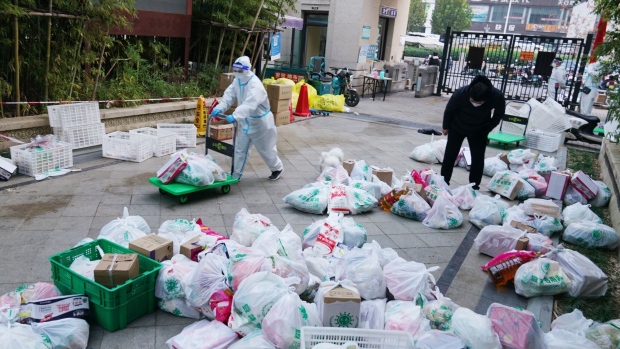Nov 8, 2022
Zhengzhou Area Lifts Lockdown But iPhone Plant Stays High Risk
, Bloomberg News

(Bloomberg) -- The world’s biggest iPhone factory will continue to be subject to Covid restrictions, after authorities in China lifted a lockdown in the district where the plant is located but said some areas were still regarded as high risk.
The city of Zhengzhou ended a district-level lockdown order for the area around the airport, the government said in a statement Wednesday. Still, several areas within that district will remain classed as “high risk,” which under the city’s Covid rules means they will continue to be subject to lockdown-like curbs. That includes restrictions on people leaving their homes.
The list of high-risk areas encompasses the Foxconn Technology Group plant -- known as ‘iPhone City.’ That means the flow of goods and people into and out of Apple’s main production base remains curtailed, potentially deepening a hit to iPhone shipments over the US holidays. The city’s ongoing restrictions have already prompted Apple to warn it would ship fewer premium devices than anticipated.
Read more: IPhone Supply Chain Gets Jolt From Xi’s Covid Zero Enforcers
It’s unclear if or when those restrictions will lift. For now, the factory will continue to operate under a so-called closed loop, or self-contained bubble, to keep production going, said a spokesperson for Foxconn, Apple’s key contract manufacturer in China.
The Wednesday statement, and its confusing impact on one of the China’s most closely-watched supply chains, reflects a trend of local officials attempting to keep Covid restrictions under the radar as public frustration with the punishing Covid Zero playbook grows.
While Zhengzhou’s government aims to “better balance virus prevention and economic development,” according to the Wednesday statement, infections continue to rise in the city, making the easing of curbs a risky exercise. Zhengzhou reported 1,043 Covid cases for Tuesday, up from 733 a day earlier.
China’s top health body has criticized some cities, including Zhengzhou, for excessive lockdown measures. At the same time, local authorities are at risk of being disciplined or fired whenever outbreaks spiral out of control, leaving them to chart a narrow path.
Companies located in high-risk areas that make it to a white list can operate in a closed-loop system, which Foxconn has been in for a while now. But without movement being eased around the iPhone plant, it’s unlikely to see the supply shortages and logistical disruption that have been slowing production dissipate.
China Covertly Shuts Cities as Covid Zero Resistance Rises
China’s commitment to Covid Zero has roiled the operations of some of the world’s biggest manufacturers and has served as a reminder of the risks of centering production in the country. Apple expects to produce at least 3 million fewer iPhone 14 handsets than originally anticipated this year, Bloomberg News reported, with softer demand for the models coinciding with the supply problems in Zhengzhou.
The situation with Foxconn’s factory comes as Covid disrupts other Chinese cities, with two more districts of southern manufacturing hub Guangzhou locked down from Wednesday. Beijing is also at higher risk of escalating curbs after its tally of new infections jumped to the highest level in more than five months.
(Adds map after third paragraph.)
©2022 Bloomberg L.P.





